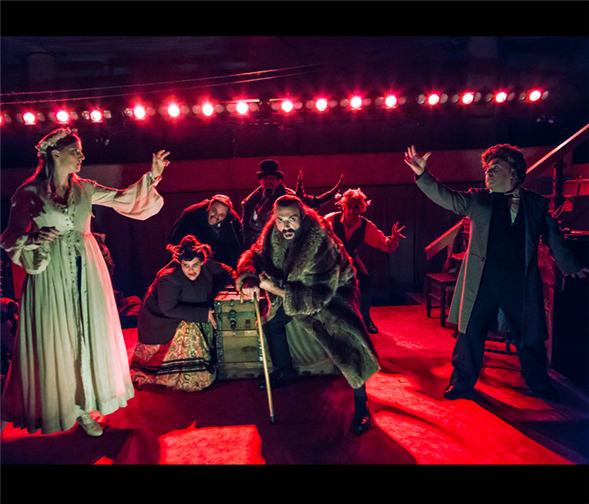Translate Page

It's an encounter with theatre history, interwoven with more theatre history.
The Black Crook, playing through Oct. 7 at Abrons Arts Center in a 70-seat underground space, offers a rare opportunity to take in the entire text of what's been called the first American musical – an 1866 work that, when produced in its original 3,200-seat Broadway theatre, featured full ballets and grand scenic transformations in its five-and-a-half-hour playing time.
The text, a melodrama of the type already becoming stuffy by the mid-1800s, was only part of the show, and it's roughly half of the experience at Abrons. The rest of the current production, adapted and directed by Joshua William Gelb, features the story behind the creation of The Black Crook. The two tales are mingled to create an eclectic but unified production, with eight actors playing multiple roles and playing period tunes on piano, accordion, cello, and even the harp.
"It's an origin story of the American musical," Gelb says, and he should know: He's researched Crook and its times for over a decade and presented a first stab at the material in 2007, well before last season's theatre-history hybrid, Shuffle Along, or The Making of the Musical Sensation of 1921 and All That Followed.
As audiences learn from Gelb's adaptation, The Black Crook text came from Charles M. Barras (yes, like embarrass), a slight playwright of the time who was desperate to raise money for the care of his wife, actress Sallie St. Clair. "It's second-rate melodrama, of course," Gelb says of the Barras script, derived from European traditions and Faust legends. Though it features dollops of comedy, the text is mostly the Gothic story of the artist Rodolphe and his deal with the evil Hertzog – the titular Black Crook – to win the hand of his beloved, Amina.
In a strange happenstance of American theatre history, Barras was pitching his script – which Gelb's material suggests might otherwise have landed in the garbage – soon after a fire destroyed the Academy of Music, leaving a Parisian ballet troupe without a New York home and a producer, William Wheatley, with an opportunity. He put the two properties together, along with songs of the period and set designs that filled his large venue.
"It's super-American in that it's thrown together from other parts," Gelb says of Wheatley's production, which achieved much of its infamy because of the dancers' scandalous clothing: skin-colored tights.
Gelb's adaptation only suggests the ballet (mostly through actress Jessie Shelton but also, comically, with the entire company) and lavish sets. Instead, it zeroes in Barras's script. "I think it's really important to engage with the actual piece itself," Gelb says.
The melodrama is performed in a style that two cast members, Randy Blair and Kate Weber, liken to commedia dell'arte or Kabuki. There are poses and gestural language, stock characters, and comic business, and since Blair and Weber's characters provide frequent comic relief, they have to master it all.
"It's hilarious and I love it," says Blair, speaking before a recent performance. With a glance at his castmate, he adds "We try to make each other laugh," and indeed, that happened onstage during at least one recent performance, when Weber had to hide her chuckles behind a fan.
Weber and Blair have been tied to the production since those 2007 performances, and Weber says Gelb's passion for both the project and the period have galvanized the company: "We've in essence been doing this show for 10 years. His excitement gets us excited."
Despite all the levity, however, the central story of The Black Crook – of poor Rodolphe (Steven Rattazzi) and scheming Hertzog (Merlin Whitehawk) – is not terribly funny, and neither is the tale of the stuttering Barras (Rattazzi) and manipulative Wheatley (Whitehawk). "It's very dark and raw and surprising," Blair says.
Meanwhile, many critics and scholars debate tagging The Black Crook as the first American musical, since its music and dance rarely fed into each other or the separately composed book. Yet it differed in many ways from the operettas of the time and the burlesques to come, leading to its continuing reputation as a first in the States.
Gelb finds the distinction impossible to make, given the slippery definition of "musical." His interest, he says, is in the link between Barras's play and his actual life, which both contain deals with devils to follow passions, aesthetic and otherwise. The Black Crook, Gelb says, "is a Pandora's box of the ways popular culture was marketed and consumed."
---
TDF Members: At press time, discount tickets were available for The Black Crook. Go here to browse our current offers.
Contributor David DeWitt has written extensively about the arts for The New York Times and other publications.
Photos by Kelly Stuart. Top photo: The cast of 'The Black Crook.'